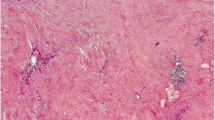Abstract
In the course of a prospective multicenter study, 40 (26 squamous cell and 14 adenocarcinomas) patients with stage IIIA and IIIB non-small cell lung cancer (NSCLC) were submitted to surgery after neoadjuvant radiochemotherapy.Pretherapeutic clinical lymph node status was compared to the lymph node involvement established in the resection specimens.Therapy-induced tumor regression was classified according to a three-step tumor regression grading system.In 29 patients (72.5%) a downward shift in lymph node involvement could be established,whereas in 27.5% (n=11) pretherapeutic lymph node status was maintained.Of 26 patients with posttherapeutic N0 or N1 status, 21 revealed less than 10% vital tumor tissue in the resection specimens (regression grades IIb or III).Patients with posttherapeutic N0 or N1 lymph node status were found to have a survival benefit compared to patients with N2 lymph node involvement, though this difference was not statistically significant (p=0.27). On the other hand, tumor regression showed a significant correlation to the overall survival period (p=0.02).Thus, therapy-induced tumor regression grading seems to be a more precise method to predict the outcome of the disease.
Zusammenfassung
Im Rahmen einer Multicenterstudie zur Therapieoptimierung nichtkleinzelliger Lungenkarzinome im Stadium IIIA und IIIB wurden Resektionspräparate von 40 Patienten (26 Plattenepithelkarzinome und 14 Adenokarzinomen) nach neoadjuvanter Chemo- und Radiotherapie histologisch aufgearbeitet und einem 3-stufigen Regressionsgrading zugeordnet.Ferner wurde der prätherapeutisch bestimmte Lymphknotenstatus dem anhand der Resektate festgestellten Lymphknotenbefall gegenübergestellt: 29 Patienten (72,5%) wiesen posttherapeutisch ein günstigeres N-Stadium auf,während es bei 11 Fällen (27,5%) unter der Therapie zu keiner Änderung des Lymphknotenstatus kam.Bei 21 von 26 Patienten mit postoperativem N0- oder N1-Status zeigte sich in den Resektionspräparaten weniger als 10% vitales Tumorgewebe (Regressionsgrad IIb/III).Trotz eines Überlebensvorteils für Patienten mit posttherapeutischem N0- oder N1-Lymphknotenstatus gegenüber Patienten mit persistierendem mediastinalen Lymphknotenbefall (N2), konnte eine statistische Signifikanz nicht gezeigt werden (p=0,27).Eine signifikante Korrelation zeigte sich dagegen zwischen dem Ausmaß der Tumorregression und der Gesamtüberlebenszeit (p=0,02). Die Bestimmung des therapieinduzierten Tumorregressionsgrades scheint somit die präzisere Methode für die Bewertung der Prognose zu sein.
Similar content being viewed by others
Author information
Authors and Affiliations
Additional information
Priv.-Doz.Dr. K.Junker Institut für Pathologie an den BG-Kliniken Bergmannsheil – Klinikum der Ruhr-Universität Bochum,Bürkle-de-la-Camp-Platz 1, 44789 Bochum,E-Mail: klaus.junker@ruhr-uni-bochum.de
Rights and permissions
About this article
Cite this article
Langner, K., Thomas, M., Klinke, F. et al. Neoadjuvante Therapie des nichtkleinzelligen Lungenkarzinoms . Chirurg 74, 42–49 (2003). https://doi.org/10.1007/s00104-002-0549-7
Issue Date:
DOI: https://doi.org/10.1007/s00104-002-0549-7




